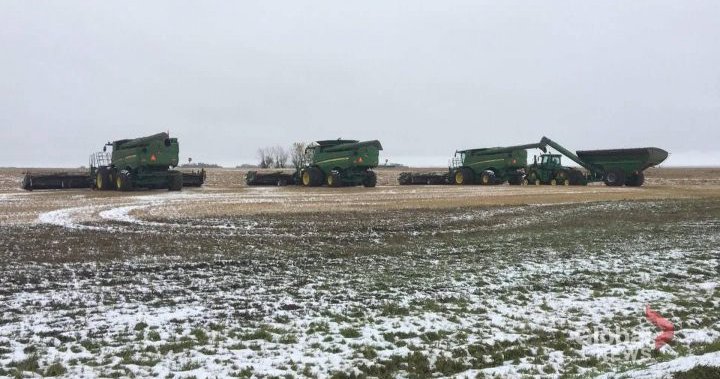The winter of 2025 has brought a welcome blanket of snow to Saskatchewan, a sight that has brought relief and optimism to the province’s farmers. While acknowledging the positive impact of the snowfall received so far, they emphasize the need for additional accumulation to ensure optimal moisture levels for the upcoming spring planting season. The snowpack acts as a natural reservoir, gradually releasing moisture into the soil as it melts, providing crucial hydration for germinating seeds and supporting early crop growth. This moisture is essential for replenishing groundwater supplies depleted during the growing season and mitigating the risk of drought during the critical early stages of crop development. Farmers are hopeful that several more feet of snow will accumulate before the spring thaw, bolstering moisture reserves and setting the stage for a successful growing season.
The importance of adequate snowfall for Saskatchewan’s agricultural prosperity cannot be overstated. The province’s economy heavily relies on successful crop production, with vast fields of wheat, canola, and other grains contributing significantly to both provincial and national GDP. A sufficient snowpack is vital for ensuring robust yields and maintaining the economic viability of the agricultural sector. The snow’s insulating properties also protect winter crops like winter wheat from extreme temperature fluctuations and frost damage, preserving their viability for spring growth. Moreover, the slow melt of a substantial snowpack helps prevent soil erosion, safeguarding the topsoil crucial for nutrient retention and healthy plant growth. The farmers’ anticipation of further snowfall underscores the crucial role this natural phenomenon plays in the province’s agricultural landscape.
At the Western Canada Crop Production Show held in Saskatoon, farmers expressed their cautious optimism about the current snow conditions, highlighting the need for further accumulation to meet ideal moisture levels. The show served as a platform for farmers to share their observations and concerns, emphasizing the significance of the snowpack for the upcoming growing season. Interviews conducted by Global News reporter Nicole Healey captured the farmers’ perspectives on the current snow situation and their hopes for more snowfall in the coming weeks. These conversations underscored the direct link between adequate snow cover and successful crop production, underlining the anxieties and expectations surrounding winter precipitation within the agricultural community.
The sufficiency of winter snowfall in Saskatchewan has a cascading effect on various aspects of the agricultural ecosystem. Beyond the immediate benefits of soil moisture and crop protection, adequate snowpack contributes to the long-term health of the land and the sustainability of agricultural practices. It replenishes groundwater reserves, crucial for sustaining the entire ecosystem and providing a buffer against future droughts. The gradual snowmelt also minimizes the risk of flooding and soil erosion, preserving the fertile topsoil and preventing nutrient loss. These interconnected benefits highlight the multifaceted role of snow in supporting a thriving agricultural landscape.
The farmers’ anticipation of additional snowfall is not merely a hopeful wish but a reflection of a deep understanding of the delicate balance within the agricultural ecosystem. They recognize that the success of their crops depends heavily on the natural water cycle, and a healthy snowpack is a fundamental component of this cycle. Their cautious optimism reflects the inherent uncertainties associated with weather patterns and the constant need to adapt to changing conditions. The discussions at the Western Canada Crop Production Show provided a valuable insight into the farmers’ practical wisdom and their reliance on natural processes for their livelihood.
The story of Saskatchewan’s winter snowfall in 2025 is a compelling illustration of the intricate relationship between nature and agriculture. It highlights the importance of natural processes like snow accumulation for sustaining food production and the economic well-being of a region. The farmers’ perspectives, captured at the Western Canada Crop Production Show, provide a grounded understanding of the challenges and hopes within the agricultural community. Their reliance on snowfall underscores the vital link between weather patterns and agricultural success, emphasizing the ongoing need to adapt to and respect the forces of nature. This narrative serves as a reminder of the complex interplay between human activity and the environment, particularly in the context of food production and economic stability.










